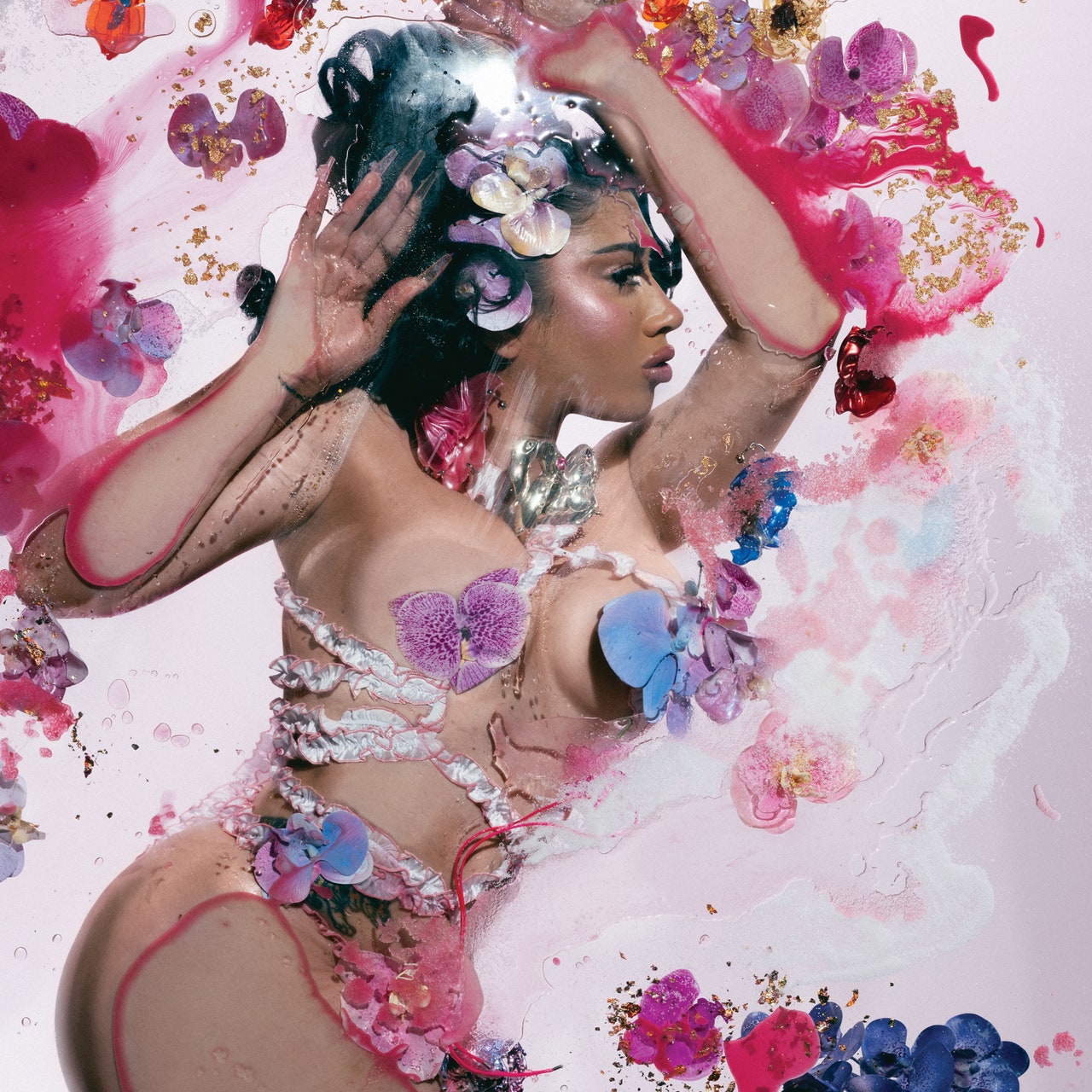In the video for “Te Mata,” a highlight from her resplendent new album Orquídeas, Kali Uchis embodies the ritual cruelties and delights of life as a femme fatale. The visual is grainy and textured, unmistakably Almodóvarian with its vivid, saturated color palette, high drama, and vintage glam. She vamps in an ivory, crystal-encrusted mermaid gown. She throws a cordless phone handset through a window. She shoves glass bottles off a table in a fit of rage. She cries a single tear in a baby-blue robe and matching lace bra, her eyes framed by immaculately feathered lashes. She chuckles when an anonymous hand presses a revolver to her forehead.
“Te Mata” is a supreme example of Uchis’ gift for crafting universes of revenge, infatuation, and sorrow. As she’s released more Spanish-language music in recent years, including her 2020 LP Sin Miedo (del Amor y Otros Demonios) ∞, Uchis has sharpened that vision, securing chart hits along the way. On Orquídeas, she writes another instruction manual for baddie behavior, where women are encouraged to stuff toxic exes into the trunks of their cars and loaf the day away in red-glitter bustiers and platform heels. But the album is also a reflection of the capaciousness of diasporic music. Despite the overwhelming commercial success of bilingual artists of Latin American descent, our corporate music industry overlords still find it impossible to believe a major label singer might thrive making original music in both Spanish and English. Like Selena Quintanilla before her, Uchis proves them wrong.
Much of Orquídeas reprises the shimmering daydreams Uchis is known for, luxuriating in background harmonies and synth arpeggios that feel like they’re enveloped in charmeuse fabrics. “Young, Rich & in Love,” “Diosa,” and “Perdiste” were designed to play in the background while you bathe in a clawfoot tub full of milk and rose petals. “Heladito” is a lovely return to form; longtime fans will recognize the doo-wop melodic sensibility and pure longing of Uchis’ 2015 Por Vida EP—though she nods to a new era, singing, “No soy pop star pero si soy internacional.”
The first third of the record is so uniformly luxurious that the songs are almost hard to distinguish. But the synth-pop glitter bomb “Igual Que Un Ángel” is a beaming exception, its cherubic hook a sure shot for TikTok virality. Over a funky bassline and prismatic chimes, Uchis and the mulleted corrido prince Peso Pluma sing about a woman who never falls prey to superficial love. Pluma’s nasal vocal tones layer effortlessly over the groove, unlocking a new superpower. Uchis’ vocal performance across the record represents a leap forward too: 12 years ago, she possessed the more limited—but still soulful—range of a lounge singer; now she stretches her voice to a fluttering whistle register on “¿Como Así?”
When she dives into Latin American idioms, Uchis is unstoppable; Latina mode is absolutely on. For “Te Mata,” the Colombian American returns to bolero after first exploring the style via her La Lupe and Los Zafiros covers from Sin Miedo. Women bolero singers have been entrenched in cultural memory as hysterical, abject divas, but with “Te Mata,” Uchis joins a growing wave of young artists reinterpreting the form as an expression of power. Over a gentle Spanish guitar and jagged string arrangements, Uchis sings of being cast as the “diabla” in a selfish lover’s story, only to realize she’s much better off without him (the kicker: he finds her newfound autonomy so painful it might kill him). Though she’s not as much of a vocal powerhouse as La Lupe, Uchis’ smoldering performance is still gorgeous, channeling the wounded desperation and hard-earned freedom of the women who came before her.
After sad-girl hour, though, it’s time for Uchis to scorch the earth in an old-school reggaeton blaze. Built on an updated instrumental of Andy Boy and DJ Blass’ “Dem Bow,” “Muñekita” recruits El Alfa and City Girls’ JT for three and a half minutes of knee-injuring perreo magic, fueled by Kali’s feline purrs, El Alfa’s twittering breakdown, and JT’s staggering levels of shade. It’s got a delicious collection of one-liners; I highly recommend adding “sana, sana, colita de rana, bitch” to your arsenal of slander. “Labios Mordidos,” which features fellow paisa Karol G, is a sapphic ode to a dancefloor diosa who’s as sweet as arepas de choclo; its kicks are harsh, its moans are orgasmic, and its lyrics are devilishly coy.
The ventures into new genres are thrilling, too. “No Hay Ley Parte 2,” a refresh of the 2022 single, adds a smutty dembow riddim to the original ’90s house production, courtesy of superstars Tainy, El Guincho, Jam City, Ovy on the Drums, and Geeneus. The new rendition also includes a verse of come-ons from Puerto Rican playboy Rauw Alejandro. His dirty talk is a fitting accompaniment to Uchis’ breezy hook; along with the added reggaeton percussion, it elevates “No Hay Ley” to a blissful crest.
On closer “Dame Beso // Muévete,” Uchis indulges in ’90s merengue. True to form, she puts her own pleasure at the thematic center of the song, and you can practically picture a frosty Presidente in your hand, the sweat dripping down your back as Los Toros Band and Toño Rosario hits blast from a speaker. Halfway through, the band picks up the pace into a full-on perico ripiao; it’s an unexpected party trick and exuberant send-off engineered for Saturday-morning cleaning efficiency.
Uchis has built her entire repertoire on stories of seduction and anguish, fantasies where women and femmes can be as bad as they are tender. On “Me Pongo Loca,” she spells out this naked truth: “Digo que a mí me vale cero/Pero tampoco soy hecha de hielo” (“I say that I don’t care at all/But I’m not made of ice either”). On Orquídeas, the Kali Uchis Doctrine of Reina Ideology—in which drop-dead goddesses never need to text back—is more potent than ever. Most importantly, the sound of Orquídeas represents the fluidity of being a diaspora kid—even if the suits will never get it.
All products featured on Pitchfork are independently selected by our editors. However, when you buy something through our retail links, we may earn an affiliate commission.










